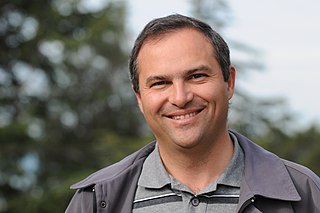Related Research Articles
The Association for Computing Machinery (ACM) is a US-based international learned society for computing. It was founded in 1947 and is the world's largest scientific and educational computing society. The ACM is a non-profit professional membership group, reporting nearly 110,000 student and professional members as of 2022. Its headquarters are in New York City.

Arthur John Robin Gorell Milner was a British computer scientist, and a Turing Award winner.

Malcolm Douglas McIlroy is an American mathematician, engineer, and programmer. As of 2019 he is an Adjunct Professor of Computer Science at Dartmouth College. McIlroy is best known for having originally proposed Unix pipelines and developed several Unix tools, such as spell, diff, sort, join, graph, speak, and tr. He was also one of the pioneering researchers of macro processors and programming language extensibility. He participated in the design of multiple influential programming languages, particularly PL/I, SNOBOL, ALTRAN, TMG and C++.
SIGPLAN is the Association for Computing Machinery's Special Interest Group on programming languages.

Xavier Leroy is a French computer scientist and programmer. He is best known for his role as a primary developer of the OCaml system. He is Professor of software science at Collège de France. Before his appointment at Collège de France in 2018, he was senior scientist at the French government research institution Inria.

Matthias Felleisen is a German-American computer science professor and author. He grew up in Germany and immigrated to the US in his twenties. He received his PhD from Indiana University Bloomington under the direction of Daniel P. Friedman.
Jean E. Sammet was an American computer scientist who developed the FORMAC programming language in 1962. She was also one of the developers of the influential COBOL programming language.

Racket is a general-purpose, multi-paradigm programming language. The Racket language is a modern dialect of Lisp and a descendant of Scheme. It is designed as a platform for programming language design and implementation. In addition to the core Racket language, Racket is also used to refer to the family of programming languages and set of tools supporting development on and with Racket. Racket is also used for scripting, computer science education, and research.
Brent Hailpern is a computer scientist retired from IBM Research. His research work focused on programming languages, software engineering, and concurrency.
Rodney Martineau "Rod" Burstall Fellow of the Royal Society of Edinburgh (FRSE) is a British computer scientist and one of four founders of the Laboratory for Foundations of Computer Science at the University of Edinburgh.
Matthew Flatt is an American computer scientist and professor at the University of Utah School of Computing in Salt Lake City. He is also the leader of the core development team for the Racket programming language.

Carl Eddie Hewitt was an American computer scientist who designed the Planner programming language for automated planning and the actor model of concurrent computation, which have been influential in the development of logic, functional and object-oriented programming. Planner was the first programming language based on procedural plans invoked using pattern-directed invocation from assertions and goals. The actor model influenced the development of the Scheme programming language, the π-calculus, and served as an inspiration for several other programming languages.

George Ciprian Necula is a Romanian computer scientist, engineer at Google, and former professor at the University of California, Berkeley who does research in the area of programming languages and software engineering, with a particular focus on software verification and formal methods. He is best known for his Ph.D. thesis work first describing proof-carrying code, a work that received the 2007 SIGPLAN Most Influential POPL Paper Award.
The International Conference on Architectural Support for Programming Languages and Operating Systems (ASPLOS) is an annual interdisciplinary computer science conference organized by the Association for Computing Machinery (ACM).
Robert Bruce Findler, colloquially known as "Robby", is an American computer scientist, currently, a professor of computer science at Northwestern University. He is also a member of the PLT group and, as such, responsible for the creation and maintenance of DrRacket. In addition to DrRacket, Findler has contributed numerous components to Racket and supervises its Web-based software library, called PLaneT. Findler is also a leading team member of the ProgramByDesign project.
Mary Lou Ehnot Soffa is an American computer scientist noted for her research on compilers, program optimization, system software and system engineering.

Kathleen Shanahan Fisher is an American computer scientist who specializes in programming languages and their implementation.

ACM SIGOPS is the Association for Computing Machinery's Special Interest Group on Operating Systems, an international community of students, faculty, researchers, and practitioners associated with research and development related to operating systems. The organization sponsors international conferences related to computer systems, operating systems, computer architectures, distributed computing, and virtual environments. In addition, the organization offers multiple awards recognizing outstanding participants in the field, including the Dennis M. Ritchie Doctoral Dissertation Award, in honor of Dennis Ritchie, co-creator of the C programming language and Unix operating system.
Martin Vechev is a professor at the Department of Computer Science at ETH Zurich working in the fields of programming languages, machine learning, and security. He leads the Secure, Reliable, and Intelligent Systems Lab (SRI), part of the Department of Computer Science.
References
- ↑ Krishnamurthi, Shriram. "Shriram Krishnamurthi: Professor of Computer Science". Computer Science at Brown University. Retrieved 2019-09-14.
- ↑ "Racket People". Racket-lang.org. Retrieved 2019-09-14.
- ↑ "Bootstrap: Community". Bootstrap. Retrieved 2019-09-14.
- ↑ Shriram Krishnamurthi at the Mathematics Genealogy Project.
- ↑ Krishnamurthi, Shriram (2003–2007). Programming Languages: Application and Interpretation. Providence, Rhode Island, United States: Perfect Paperback. ASIN B00262R7B0 . Retrieved 2019-09-16.
- ↑ "Robin Milner Young Researcher Award". Special Interest Group on Programming Languages (SIGPLAN). Association for Computing Machinery. 2012. Retrieved 2019-09-14.
- ↑ "Influential Educator Award". ACM Special Interest Group on Software Engineering. Association for Computing Machinery. 2018. Retrieved 2019-09-16.